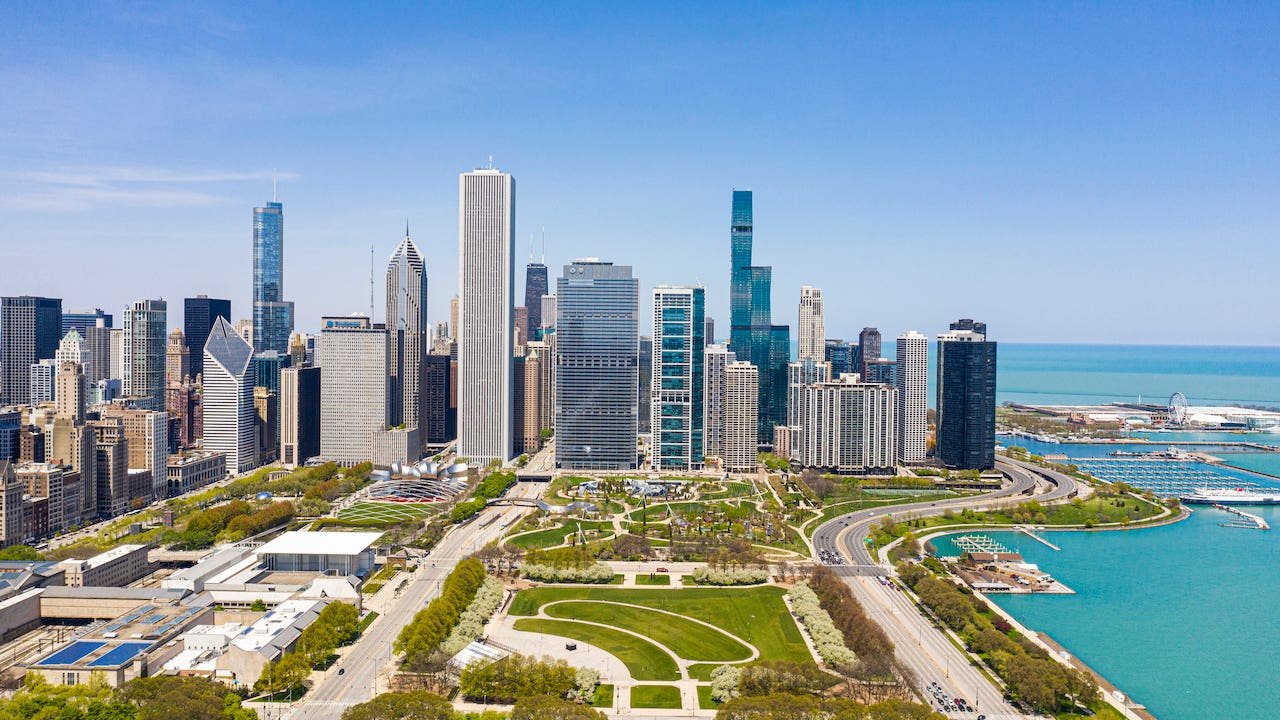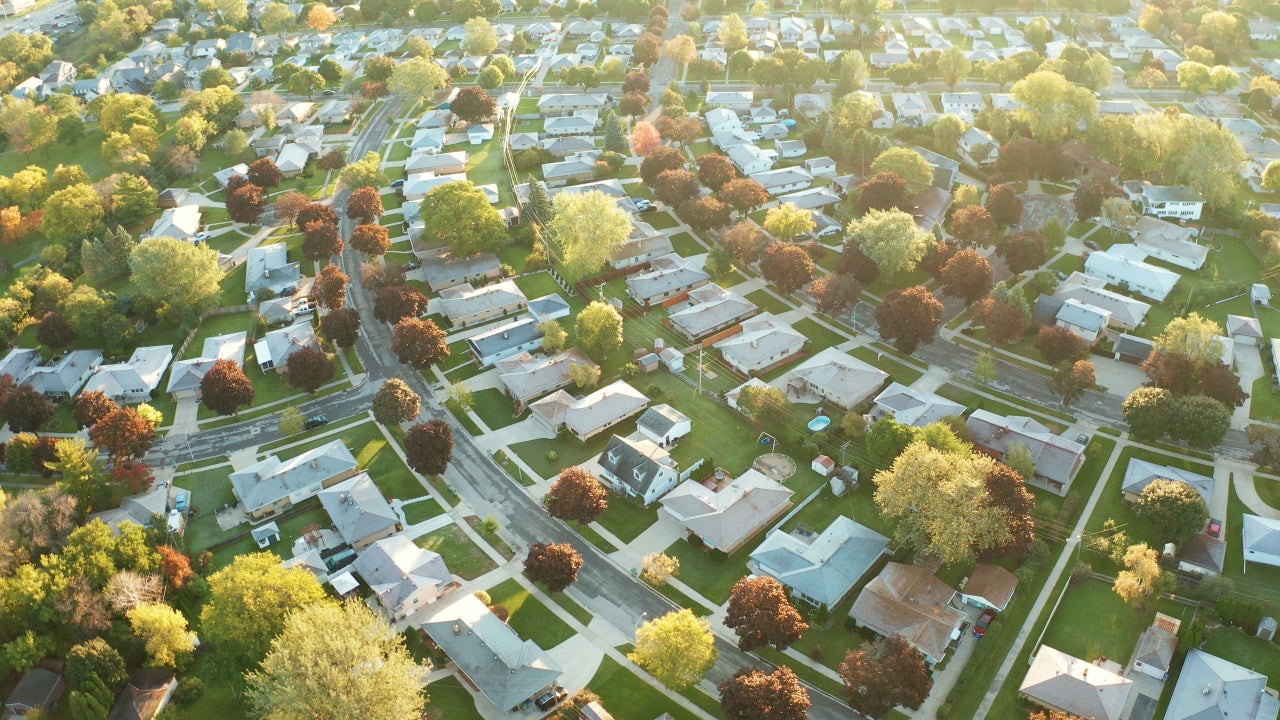Chicago housing market: Everything you need to know

Whether you’re looking to move to the Windy City or you’re tired of that wind and ready to sell your place, read on for a comprehensive rundown of what you need to know to navigate the Chicago housing market.
Chicago housing market overview
The Chicago housing market hasn’t been nearly as hot recently as other markets around the country — especially warm-weather climates like Arizona and Florida. Believe it or not, prices here throughout the pandemic have hovered in the $300,000 range, peaking in the spring of 2022 when they jumped above the $370,000 mark, according to Redfin data. Overall, though, Chicago’s housing market feels more like a calm day on Lake Michigan: not too choppy.
However, it’s important to understand that there isn’t a simple snapshot of the entire Chicago housing market, simply because the city is massive. The Second City — it’s actually the third-biggest in the country in terms of population — covers 234 square miles. Prices and conditions can vary widely from one neighborhood to another. For example, according to the Institute for Housing Studies at DePaul University, median prices in Humboldt Park hover around $211,000. Head east to the mansion-lined streets of Lincoln Park, though, and the median price tag jumps to more than $1.2 million.
Chicago housing trends and stats
- According to February data from Illinois Realtors, the median price of a home in the Chicago metro area is $290,000 — exactly the same as it was a year earlier. Within the city limits, however, prices fell slightly from $320,000 to $312,500.
- The number of home sales in the metro area has declined by 29.4 percent year-over-year. In the city proper, the drop is even steeper at 37.3 percent.
- Homes spend an average of 87 days on the market before selling in Chicago, per Redfin. That’s a 23-day increase from a year ago.
- Chicago homes typically sell for 2.6 percent less than their initial list price.
- Just over 12 percent of sellers dropped their price in February.
- In Illinois overall, closing costs are typically 2.1 percent of the purchase price, according to data from ClosingCorp. On a median-priced $290,000 home in the Chicago metro area, that comes out to $6,090.
Should you buy or sell in the Chicago housing market?
High mortgage rates and continued economic uncertainty mean it’s a tough time to think about buying or selling a home, in Chicago or anywhere else. Here are some key considerations for both sides of the transaction.
If you’re a home seller
If you’re thinking about selling your home in Chicago, it’s important to consider the market in your specific area. Prices have remained relatively flat for a while, but as you try to assess how much your house is worth, keep in mind that a two-bedroom condo in the hot West Loop will look a lot different than a two-bedroom condo in Uptown — or a single-family home in the suburbs.
Additionally, consider your timeline carefully. Buying activity tends to pick up steam in the late spring and summer, while fewer buyers are going to be looking during one of those windy Chicago winters.
Finally, if you’re thinking about selling your home in Chicago and moving to a new spot around the country, be sure to estimate what your cost of living will be in your next home.
If you’re a homebuyer
You might see headlines about a cooling housing market and feel like it’s a good time to buy a house. While it is true that house-hunters are probably in better shape now than they were in 2022, high mortgage rates are going to have a massive impact on how much house you can afford. The best way to figure out how much you’ll be able to borrow is to get preapproved for a mortgage. If you’ve never owned a home before, you may also want to explore first-time buyer programs in Illinois, which can help cover your down payment and closing costs.
Another essential question for buyers is how much to offer on a property you’re interested in. In February, homes typically sold for 97.4 percent of their initial list price, so don’t be afraid to negotiate. Even after you go to contract, you may be able to get the seller to cover a portion of your closing costs. A February report from Redfin found that more than 43 percent of sellers in Chicago offered concessions at the beginning of 2023 — a clear indication that buyers have some bargaining power here.
Chicago housing market predictions
Several big businesses have left the Chicago area in recent months, and you may be wondering if individuals will follow suit. While some people have certainly moved away, the city’s housing market is not about to crash. In fact, a forecast from the University of Illinois-Chicago predicts that median prices will climb to more than $341,000 by June.
Regardless of housing predictions, though, it seems clear that the Chicago housing market will include significantly fewer sales in 2023. Prices may be lower than the national median, but inventory is still low as well. If you’re considering whether Chicago will be a buyer’s or a seller’s market, the likely answer is that neither side will have an overwhelming advantage.
Find a Chicago real estate agent
How much should you ask for your condo in River North? Should you buy in Logan Square or Lincoln Square? Is it better to be a buyer or seller in the summer or the fall? There are so many nuances to buying and selling real estate in Chicago, and you’ll be in a much better position to navigate the market with a real estate agent by your side. Look for a local pro with lots of experience with your specific neighborhood.
FAQs
-
Home prices within the Chicago city limits have dropped slightly in the past year, from a median price of $320,000 last February to $312,500 this February, according to data from Illinois Realtors. When looking at the entire metro area, though, prices have remained relatively flat.
-
Chicago’s median price data can be a bit deceiving. On the surface, the $290,000 price tag in the metro area is significantly lower than the national single-family home median of $363,000. However, Chicago’s data encompasses a vast range of housing types and locations, from one-bedroom condos to multi-million-dollar luxury properties, and like many major urban cities, apartment life is common. In addition, homeownership isn’t that cheap here once you buy: Illinois residents pay some of the highest property tax rates in the country.
Why we ask for feedback Your feedback helps us improve our content and services. It takes less than a minute to complete.
Your responses are anonymous and will only be used for improving our website.
You may also like

What is a physician mortgage loan?

How much house can I afford with a $180K salary?

How to buy a house in Missouri

‘We buy houses’ companies in Illinois


